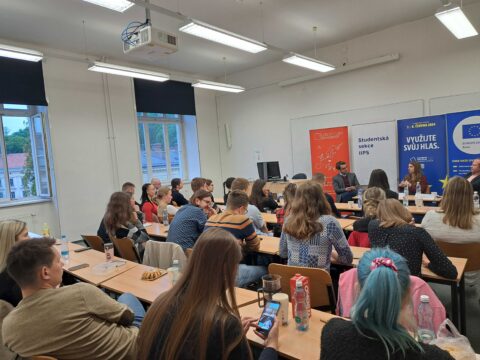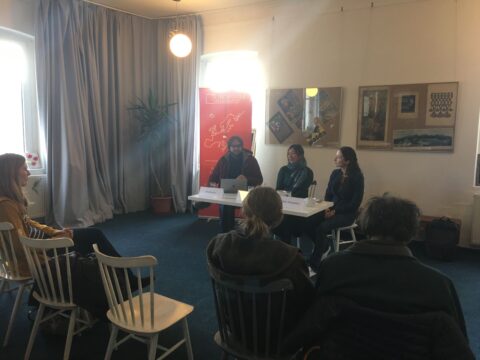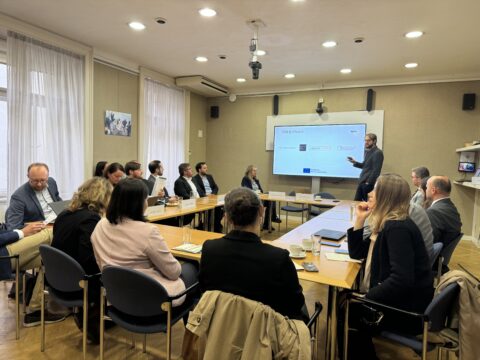RevivEU discussions in the V4 capitals and regions
Throughout the first half of 2024, the teams behind the RevivEU projects organised several discussions in the capitals of the four project countries, along with regional debates targeted at a wide public audience, with the aim to connect the findings of the project with the current developments and most pressing topics in the society.
Poland
Three public debates took place in the capital city, Warsaw (17.1.2024), one in a big city, Poznan (21.1.204) and one in a small city, Wloclawek (17.2.2024). Each event targeted a different segment of society – the Warsaw event was prepared for people active in society and interested in EU affairs, the one in Poznan was prepared for people active in their local communities but without vast knowledge about the EU, and the one in Wloclawek was student-oriented. The event in Warsaw turned out to be unsuccessful in terms of participation because of the snowstorm, which prevented many pre-registered participants from joining. Events were organized in cooperation with partner organizations: NDI, Campus Future of Poland, and Cuiavian University Campus. Each event lasted for ca. 90 minutes.
Every debate started with a brief presentation of the RevivEU project and its main outcomes. All participants were encouraged to visit the project website and get acquainted with the recourses available there. The debate was moderated by representatives of Projekt: Polska, namely dr Milosz Hodun (Warsaw and Wloclawek) and dr Maciej Milewicz (Poznan). They were lively and included free exchange of thoughts between participants. Around 75% of all participants raised their opinions or asked questions. Participants in Warsaw were the most interested in the part on migration, in particular in regard to migrants/refugees from Ukraine and Roma people (there were members of the Roma community present in the event. Participants in Poznan were the most passive of all groups. They asked the most basic questions about the EU and were willing to change the discussion into one on the general benefits and costs of Polish membership in the EU. Participants in Wloclawek were the most enthusiastic about the meeting and curious about the project (the debate lasted ca. 2 hours). They asked questions about the project in connection with upcoming EP elections and were interested in how much migration and the rule of law (in particular, the anti-gender discourse) would influence the election results.
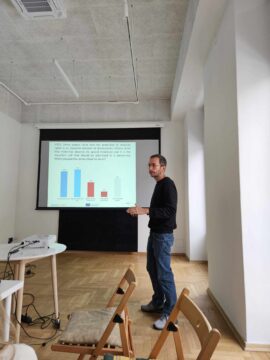
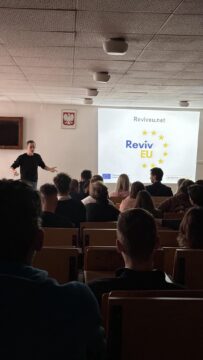
Slovakia
The Bratislava Policy Institute organised the first of two insightful public panel discussions on February 13th, 2024, in Trnava, under the facilitation of Denisa Karabová, the BPI project manager for RevivEU. The session focused on presenting the most relevant RevivEU data from both analyses and polls, which served as a basis for an engaging discussion with attendees on the current trends in the rule of law within Slovakia and its comparison with other VisegradFour (V4) countries. A significant point of interest was the post-election developments in Slovakia, examining their implications for the rule of law. Furthermore, the discourse extended to the reactions of European institutions, particularly in relation to the EU recovery plan and Slovakia’s challenges in adhering to the investment implementation schedule.
On March 5th, 2024, the second discussion took place in Bratislava, hosted by Michal Vašečka, which continued the theme of scrutinizing rule of law trends within the V4. The session once again highlighted critical insights from the “RevivEU” comparative analysis, notably pointing out Slovakia’s lag in meeting its investment implementation timelines. Both events were marked by their success in fostering an informed dialogue among stakeholders about pressing European and domestic issues, thereby underscoring the critical role of such public engagements in policy discourse.
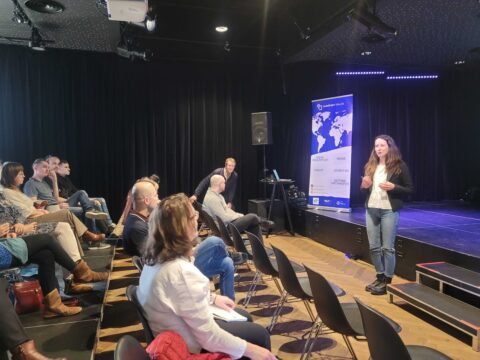
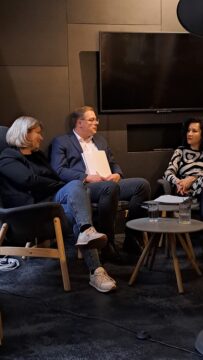
Hungary
On March 27, 2024, an event titled “European Parliament elections and the radical right-wing” was held at Central European University in Budapest. The conversation took place between Dániel Róna, director of the 21 Research Center, and Bulcsú Hunyadi, head of programmes at Political Capital, moderated by Ábel Bojár, research director of the 21 Research Center.
The discussion commenced with an exploration of the radical right-wing concept, transitioning to the forthcoming European Union Parliamentary elections. Questions arose regarding which party families would strengthen or weaken, and whether a populist/eurosceptic breakthrough on the right was anticipated. The potential factional alignments of these parties, including Fidesz’s alignment, were also deliberated upon. Although a populist breakthrough wasn’t expected, consensus prevailed that these parties would indeed fortify. Our speakers attributed this strengthening to the resurgence of migration pressure at Europe’s southern borders, underscoring migration as a pivotal topic for the European radical right wing, driving its electoral success. Ábel highlighted an intriguing paradox: while many radical right-wing parties are Fidesz’s natural allies at the pan-European level, they paradoxically remain sensitive to the allocation of their own countries’ taxpayers’ money by Brussels, which indirectly sustains the Hungarian government.
On April 4, 2024, an event titled “Environmental Protection and Battery Factory” took place at Baross16 in Debrecen. The roundtable discussion featured Éva Kozma, representing the Mothers for the Environment Association in Mikepércs, and Dr. István Fábián, Professor of Inorganic and Analytical Chemistry at the Department of Chemistry, Faculty of Science and Technology, University of Debrecen. The discussion was moderated by Dorottya Lovász, an analyst at the 21 Research Center.
The discussion commenced with an overview of the main findings from our climate change attitude research conducted last year. It was underscored that the Hungarian population views climate change as a factual reality and is not particularly sceptical about the extent of human responsibility for its consequences. The majority perceives it as a significant problem necessitating immediate action, primarily expected from global stakeholders. Sensitization and dissemination of information regarding the climate emergency play a crucial role in ensuring that other pressing issues do not divert the attention of decision-makers and citizens.
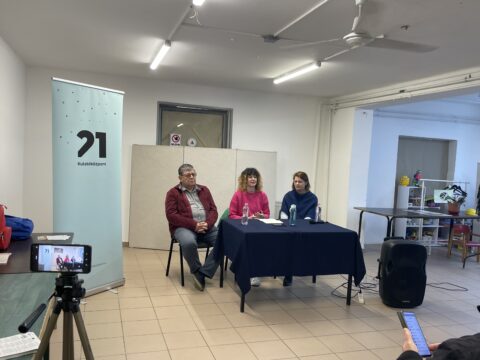
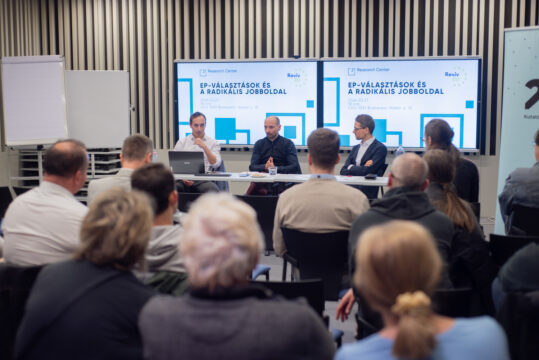
Czechia
The Czech public discussions took place on the 10th of April in Prague and on the 22nd and 24th of April in the regions, in the cities of Liberec and Brno. Given the pre-election campaign and the different topics important to the three locations, they all focused on different aspects of the RevivEU project and attracted slightly different audiences.
The Prague debate was attended by a more professional audience, including guests from other European countries, and focused mainly on the topic of the rule of law. The debate in Liberec was focused on the climate policies in the EU, and their practical aspects and developments in the region, with one of the guest speakers being a local environmental activist. The Brno debate, given its venue at the local university, attracted a younger and more engaged audience and focused on the migration topic – both in terms of the campaign narratives before the EP elections and on the recent experience with migration from Ukraine.
